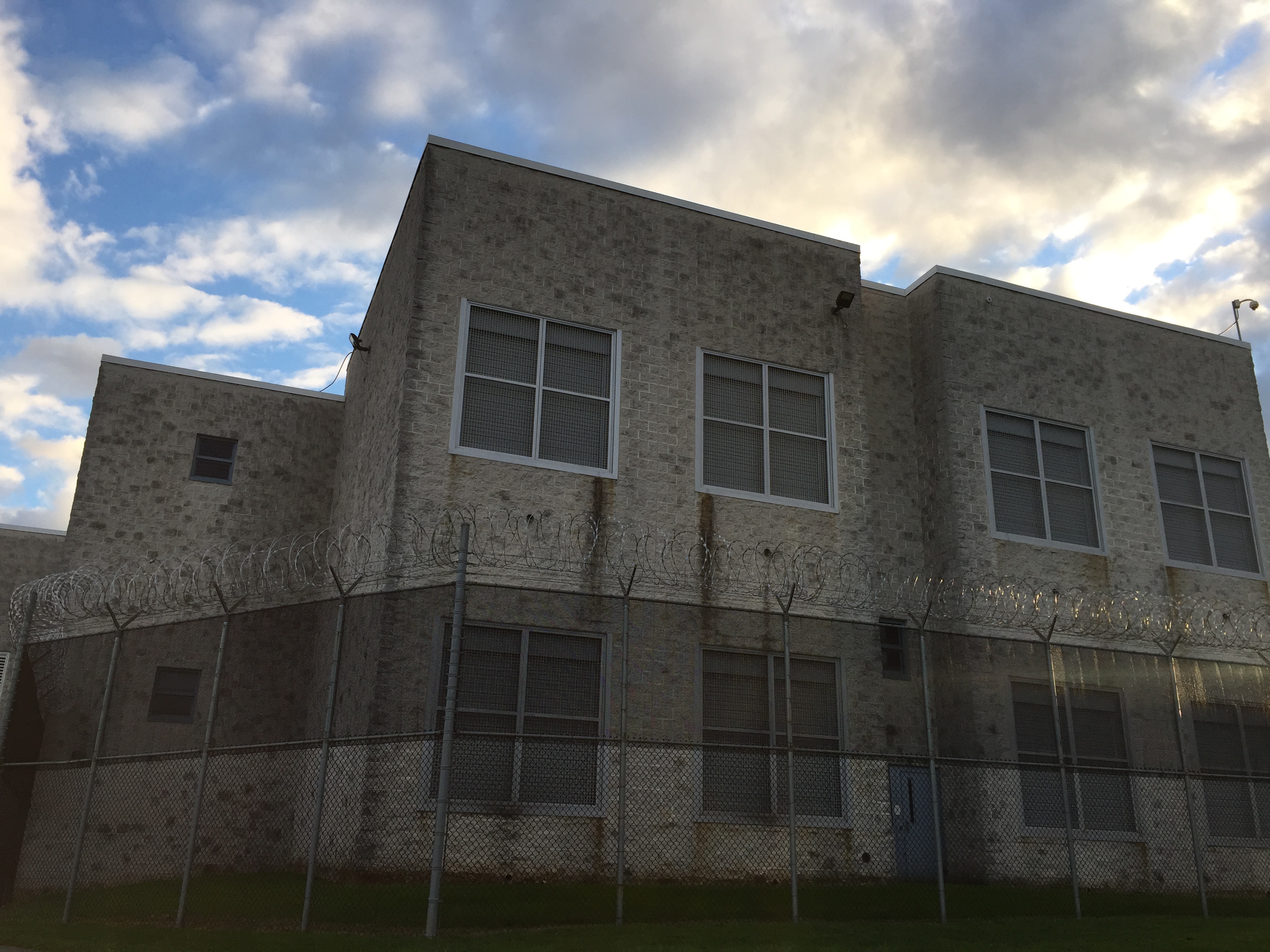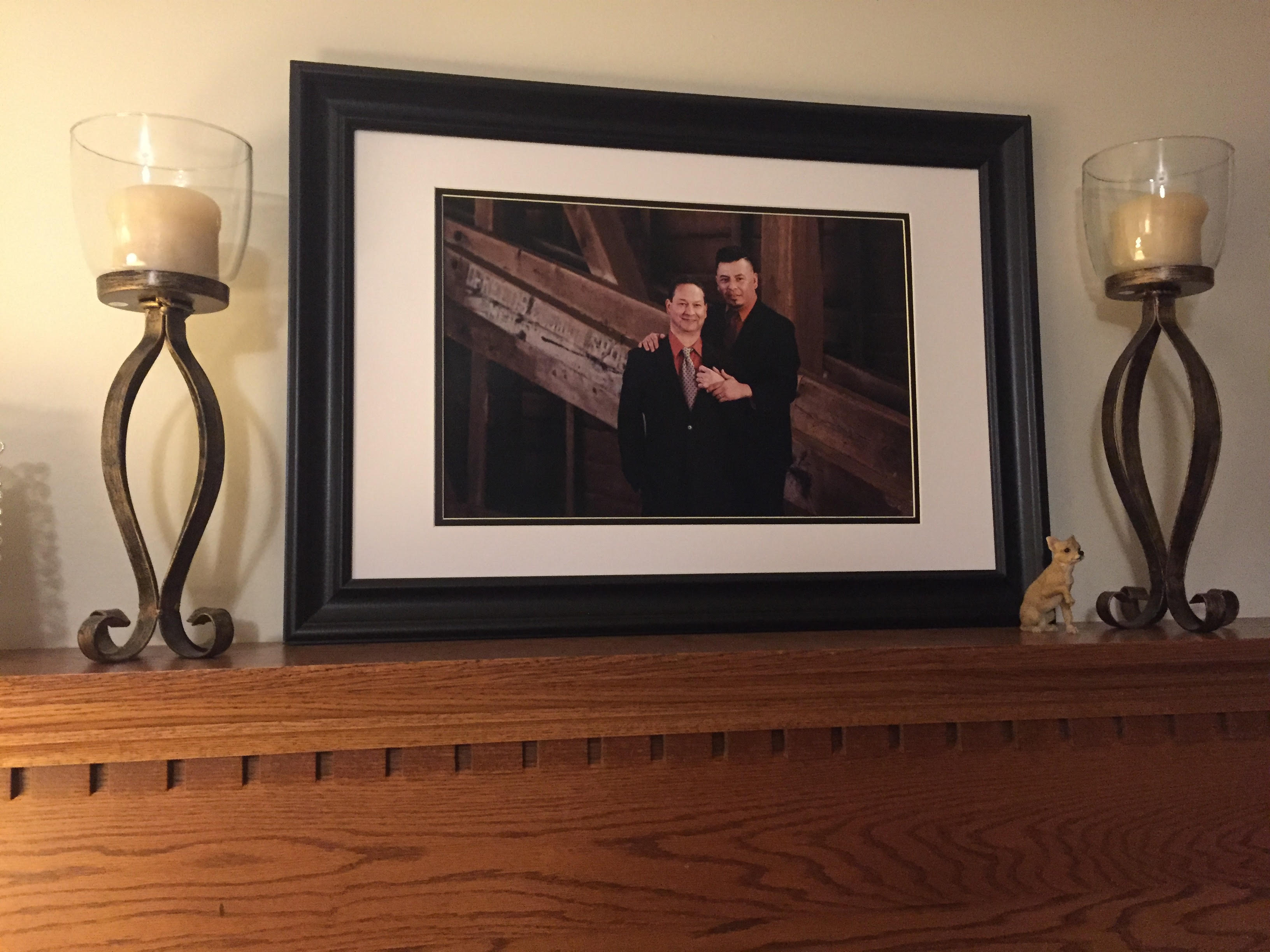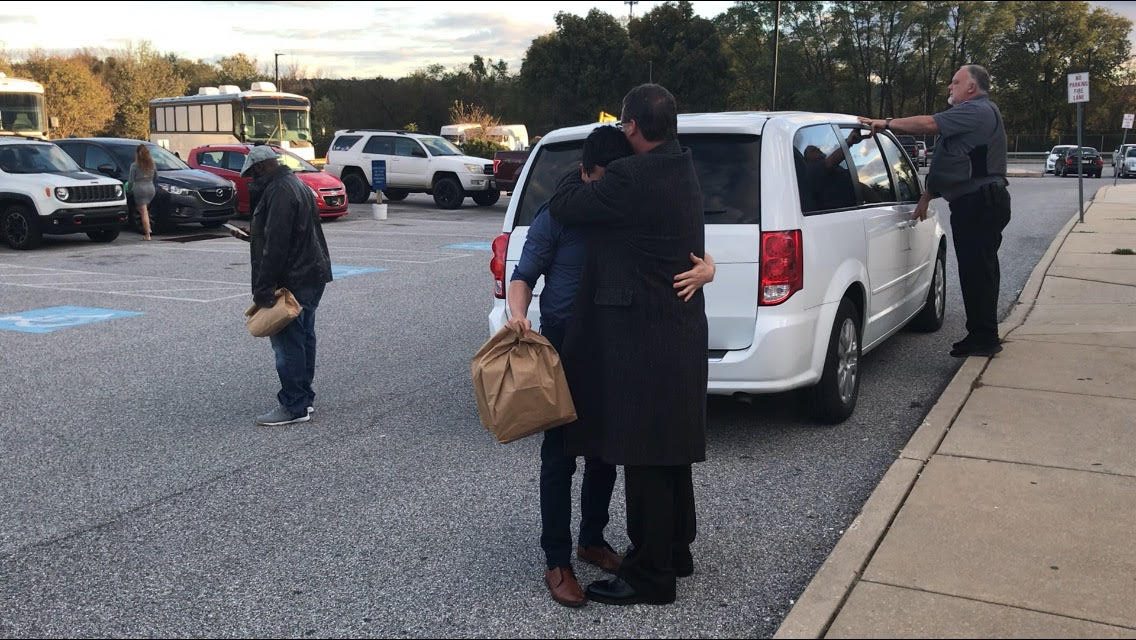On a Wednesday in late October I made the long drive out to York County Prison in south-central Pennsylvania. Paul Frame had texted me a week before, letting me know that Iván Nuñez Martínez, his husband, was finally getting a bond hearing. It had been nine months since Paul and Iván had gone to what they thought would be a routine interview at the USCIS field office in Philadelphia. Instead, Iván had been arrested by ICE officers and driven to York, where ICE has an Intergovernmental Service Agreement to house roughly 600 immigration detainees. (I wrote about their case in September.)
Paul had gotten used to making the hour-long drive from the home they had shared in Chester County, west of Philly; he would go out on Sundays and Thursdays, walk through the metal detector, then sit across from his husband, separated by a thick plate of bulletproof glass, speaking with him through a telephone receiver. Over time, Iván’s uniform changed color, from orange to green then finally maroon. Each shift signaled a new housing unit, a new position within the constrained ecosystem of the prison.
Paul couldn’t understand why Iván wasn’t getting bonded out. Paul has money—he owns a successful cattle auction business in Lancaster County. There’s a long paper trail of Iván paying his taxes; Paul had even added him to the deed of his house in tiny Buckstown. The government knew all of this because it had been included in the tall stack of documents they had submitted while applying to certify their marriage, a crucial first step to formalizing Iván’s status. But hardly any immigration detainees at York were getting bonded out under Trump, their lawyers explained. The government hadn’t release any official guidance, but the message had been made clear: anyone accused of violating a deportation order was a flight risk, no matter the extenuating circumstances.And so Iván remained inside, watching the seasons change through the two large windows in his unit’s recreation area. One day in late September, he heard a rumor while working a shift at “el dragón,” the enormous industrial dishwasher that belched out hot steam. Something has changed, a friend who also worked in the kitchen, told him: I hear we can get bond now. Paul heard something similar at around the same time; an immigration lawyer he was acquainted with told him that a recent circuit court decision would probably play in Iván’s favor. Paul got the call from their lawyer, Audrey Allen, a few days later: Iván had gotten a bond hearing. Could Paul gather some notarized letters of support?

I got to the prison shortly before 1 o’clock. There was Paul, in a tan button-down shirt and khaki slacks; he was flanked by Allen, her co-counsel—two lawyers from the corporate firm DLA Piper, who were working on the case pro-bono—a lawyer from the ACLU, and three friends. A few minutes after I arrived, a guard called for us—“Nuñez!”—and shepherded us toward a mechanized sliding door that was, curiously, open. Two workers were tinkering with the door’s mechanism; once we’d all made it through, they activated it manually and we all watched as it slid shut, locking us into the hallway. When the door to Courtroom #2 buzzed, we walked into a windowless chamber lined with soundproofing panels, the far wall painted navy-blue, featuring a big brass federal Executive Office of Immigration Review seal and a loosely draped American flag. We sat in two rows of wooden pews while the bailiff and court clerk argued; the schedule had apparently been thrown off due to the door’s repair job. “What am I supposed to tell him?” the clerk asked. “Do you want me to tell the judge? I’ll tell the judge,” said the bailiff. They disappeared for a minute, then returned, walking ahead of the judge, Kuyomars Golparvar, a skinny, stern-faced man draped in black robes. The whole thing felt slightly uncanny, as though everyone were play-acting, until the clerk said “all rise,” and the bailiff walked over to a side door I hadn’t noticed, opened it, and called out: “Nuñez!”
Iván walked in wearing his maroon jumpsuit, gave a nervous look towards Paul, then shuffled over to the shiny table where one of the DLA Piper lawyers sat with Audrey and an interpreter, a stocky guy with a close-cropped haircut and a tie. After Iván put on a pair of headphones, we were off: the judge announced that “we are on the record,” listed off the materials that had been submitted to the court—which included a transcript of his own August 15th decision that Iván was not eligible for asylum and that the deportation order against him would be upheld. (Iván is currently appealing that decision.) The judge thanked the government lawyer—a tall, athletic-looking middle-aged man named Jeffrey Bouvier—for submitting this last exhibit. Golparvar spoke in a curious way that I imagine is standard for judicial speech, moving the case forward by explaining every step of the process (“as this is a bond hearing, it’s the government’s burden to prove that the defendant is a flight risk”).
Bouvier—who sat slumped behind an open laptop and next to a wire cart crammed with manila folders—spoke first, laconically recounting the case against Iván. The government wasn’t arguing about his credibility, Bouvier said, nor were they “asserting that he is a danger to the community,” but they did¸ he insisted, consider him to be a flight risk. He’d entered the country illegally twice, and he clearly did not want to return to Mexico. Here, he referenced the asylum petition in which Iván and his lawyers had claimed that Iván faced persecution, abuse, even death in his home state of Michoacán. “Any rational human being would want to avoid that outcome, your honor,” Bouvier said. “You would or I would. At the end of the day, if an order of removal is issued against him and we send him a letter to voluntarily show up, he is not going to do that unless he has a significant financial burden.”
“I remember this case,” said Golvparvar, thanking Bouvier. Then he asked Iván’s lawyers for their rebuttal. Ilana Eisenstein, the senior DLA Piper lawyer, started to answer by reminding the judge—and stating for the record—that Iván was only arrested because he appeared voluntarily at the USCIS office. “Yes, like I said, I remember the case,” Golparvar said, interrupting, telling her that he was only interested in her response to the government’s claim. Ilana referred to Iván’s “truly remarkable” ties to the community, the multiple notarized letters showing a “touching level of care and community engagement.” “Your honor,” she concluded, “this dispels the notion that this is someone who is going to evade the court.”
Golparvar peppered Eisenstein and Allen with questions about Paul’s work, their new home. “Is Mr. Nuñez listed on the deed?” the judge asked. “No, your honor,” Allen replied, explaining that Paul had moved while Iván was incarcerated. The judge asked whether Iván had been employed, whether he would be able to find work if he were released. “Yes, your honor.”
Golparvar thanked the lawyers, then announced that he was going to make his decision. “I do deem that he is a flight risk,” he said. I stopped writing and looked up to watch Paul, who sat apart from us, in the first pew. The back of his neck, I noticed, was burnt bright red. Then—“There are mitigating circumstances,” the judge went on. He told us that he remembered the case, that he was “sympathetic” to Iván’s position. He acknowledged Paul. He acknowledged the government’s position. Then—“I am setting bond at $10,000, an amount appropriate to ensure his continued compliance with DHS.” Gasps and sighs, muffled and quiet, as the judge asked Eisenstein and Allen whether they wished to appeal—“no, your honor”—then asked Bouvier whether the government wished to appeal—“no, your honor.”
Golparvar hit the gavel, declared us off the record, and wished Iván good luck. As the bailiff led him back to the holding cell, he flashed us a smile. Paul’s face, when he turned to face the door, was expressionless, a reflection, perhaps, of the ambiguous nature of the decision. Though Iván’s case was far from over—and though Paul would need to post the entire $10,000 himself—the judge’s decision meant that Iván was headed home. It was the first bit of good news the couple had received in months.
We stood and made our way to exit, but the door to the hallway did not buzz open. The lawyers spoke quietly among themselves and with Paul. His friends reached out to squeeze his arm. After a few awkward moments, the bailiff apologized to us, told us that the door was still being repaired and we couldn’t leave, and asked us to sit back down—the judge had a full docket and couldn’t bear any further delays. Then the bailiff walked to the door of the holding cell and called out another name.
Half an hour (and two cases) later the door buzzed open. We stood and quickly made our way to the waiting room, by this time mostly full. The guard on desk duty leaned back in his chair and asked Paul: “So, you coming back?” Paul stopped short. “No.”
“Really?” the guard asked, his voice a mixture of surprise and amusement. “Not for a while, at least,” Paul muttered, before making his way over to the desk where they process bond payments.

Last Saturday, I drove out to visit Paul and Iván in their new home. Late last year, they had decided to sell their old house and move closer to Paul’s auction business; he was beginning to tire of the long commute and the demanding hours. Just a few days after the house went onto the market, Iván was detained. Paul had had to enlist help for the move, and he resented the loss of their privacy, of the intimacy of the home he’d built with Iván. “It wasn’t supposed to be like this,” he would repeat, whenever we spoke.
I arrived at their new house just after 5, in time to watch as a magnificent sunset unfolded at the bottom of the tall hill that ran down to PA route 401 from their backyard. And it was Iván who opened the front door.
“I dressed up for you, Lucas!” Paul called out, somewhere behind him, in patterned flannel pajama pants and the kind of lime-green t-shirt given out at benefit runs. Iván was wearing tight-fitting dark blue pants, a flat-billed cap and a t-shirt with Snoopy lying flat on his back, a speech bubble reading “Nope, not today…”. A few balloons were strung up in the entryway; Halloween decorations dotted the house. Neither could stop smiling.
We sat on the couch to talk; we started with bottled water but quickly moved to Heineken (for me), Moscato (for Iván), and Screwdrivers (for Paul). We talked about the case. They were both bewildered by the sudden change in fortune. Iván was released almost unconditionally—no ankle monitor or house arrest—although the government had kept his Mexican passport and ID. His freedom was constrained and contingent—“we’re nowhere near out of the woods,” Paul kept saying—and yet, and yet, and yet: here was Iván, relaxing on the couch, sipping a glass of chilled white wine.
Eventually, we talked about what life had been like inside. It could be hard, Iván admitted. He told us stories about fights narrowly avoided, about power-drunk corrections officers, about supplies and commissary goods stolen, and about homophobic insults and distrust. But there was another side to the experience, Iván told us, one of mutual trust and solidarity. The detainees in York had been picked up in Delaware, Jersey, Maryland, and West Virginia, in addition to Pennsylvania, and many spoke little or no English; most—at York and across the country—lack lawyers, money, or support. Because of his connections to the outside world, his regular visits from Paul and his friends, his steady commissary account, his dedicated lawyer, his media attention, and his fluency in English, Iván became someone you could ask for help, whether it was purchasing an Advil from the commissary—or a toothbrush, or extra soap, or a bag of chips—or filling out a request to get a haircut, to visit the medical unit, or to call a lawyer. “I was kind of a good guy, in there,” he said.
(“So that’s why your commissary account was always running low,” Paul broke in, laughing. Iván reached over and gave Paul’s knee a little squeeze before continuing.)
Before the hearing, he told us, he had been nervous, almost despairing; two of his closest friends inside had been denied bond the Monday before, and there was a general consensus that judges tended to be crabbier in the afternoon sessions.
When he walked into his housing unit, he was met with the expectant gazes of his fellow “bunkies,” many of whom had been detained for as long as he had. “When you go back to the block from court, everybody’s waiting for you,” he said. “They want to know what happened. They are always excited to see if you’re going to be freed or if they denied everything. So when I started to smile and cry, my friends came over to me and said congratulations. That’s when you—you feel much better after that. And like, if you have bad news, it’s the opposite. Everybody coming to you anyway, saying I’m sorry, what are you going to do now?”
He thanked them, and then he made his way to his place in front of el dragón; the kitchen was in the middle of cleaning up from lunch.
“You went back to work?” I asked, incredulously. “Yeah,” he said, shrugging, “back to work.” Everyone there congratulated him as well: “good news or bad news is running fast, over there,” he said, laughing. “Trust me. It’s crazy.”
Given the hour though, he assumed he wouldn’t be released until the next day. Around 4:45, though, a guard called for him. “Hey, Nuñez! B and B!” He stopped what he was doing, shocked, and for the second time that day, he was surrounded with applause and cheers. He was to report for outtake processing, at the opposite end of the prison. He was being released.
Paul was standing outside the prison in a long herringbone overcoat when, at 5:28 PM, a white van with municipal plates pulled up outside the immigration wing’s front entrance. “Is this them?” he asked, quietly.
Iván stepped out of the van carrying a small paper bag. The men embraced. “I can’t believe it,” he told me, while Paul went to the car to get him a sweater. “I wasn’t expecting it. Let’s see what happens from here on out.”
They got into their car and pulled onto PA-30 heading east. Crossing over the Susquehanna River, they ran into a huge mess of traffic. “It’s funny,” Paul told me later, “all these months of driving out to see him and I’ve never driven out there during rush hour, never hit traffic, and that day, of all days . . .” They crawled to an exit, and took it. They wound up at Shady Maple, a Pennsylvania Dutch-style “smorgasboard” restaurant and farmer’s market.
When they walked in, Iván was shocked by the quantity of food, by the smiling faces of the diners. “I was lost,” he recalled, swirling his wine. “It felt like a bad dream.” They bought a few groceries and made their way home.

Bad Paperwork, Lucas Iberico Lozada, immigration, asylum, prison, York, Paul Frame, Iván Nuñez Martínez






